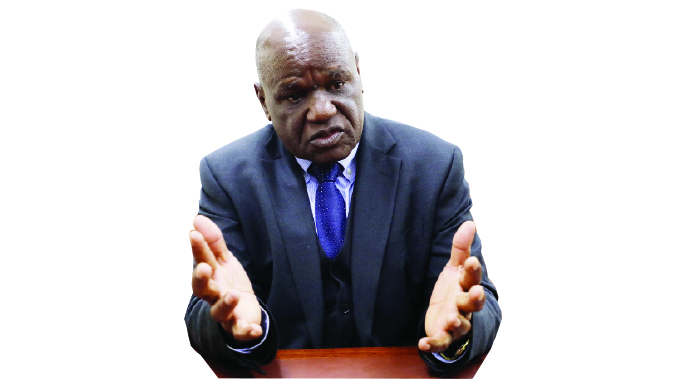Chief Justice Malaba cleared

Harare Bureau
CHIEF Justice Luke Malaba will now serve in line with the Constitution until his 75th birthday in May 2026 after the Constitutional Court yesterday overturned a High Court order and confirmed that all medically fit judges of the three top courts can extend their terms of office until they reach 75.
The right of judges of the High, Supreme and Constitutional Courts to extend their terms for five years after reaching the normal retirement age of 70 was enshrined in the second amendment to the Constitution enacted shortly before Chief Justice Malaba turned 70.
The Chief Justice promptly exercised his right, and produced the required medical certificate stating that he was physically and mentally fit to continue in office.
On production of that certificate President Mnangagwa, as the Constitution requires him to do, made the formal order on May 11 just four days before the Chief Justice’s 70th birthday.
However, a group of lawyers challenged this decision in an urgent High Court case, heard on the May 15, coincidentally the Chief Justice’s birthday, and the three-judge panel ruled that the Constitutional right applied only to sitting High Court judges and not to sitting Supreme Court or Constitutional Court judges. They mistakenly equated a term limit with a retirement age.
The Chief Justice promptly appealed to the Supreme Court, which suspended that ruling, but instead of the matter winding its way through the two higher courts on appeal and counter-appeal, a Bulawayo man exercised his citizen rights to ask the Constitutional Court to make the final ruling by confirming or quashing the High Court orders, as the Constitution requires it to do.
Mr Marx Mupungu of Bulawayo approached the Constitutional Court seeking to overturn the High Court judgment, which he argued impugned the conduct of the President and Parliament for exercising their constitutional mandate by passing the second amendment to the Constitution giving all judges the option of extending their term, if medically fit, for another five years after the set retirement age of 70.
The full bench of the Constitutional Court, presided over by Deputy Chief Justice Elizabeth Gwaunza since the Chief Justice was recused, unanimously disagreed with the interpretation of the law made by the High Court on the matter and quashed that May decision.
In the pair of judgments, Justice Bharat Patel with the agreement of the rest of the bench dealt with the constitutional issues, finding that the High Court had erred and quashing its orders.
Justice Rita Makarau, again with full agreement, dismissed the application for the Constitutional Court judges to recuse themselves since they had been cited in the original High Court application saying that citing was “maladroit”.
Justice Patel said the orders made by the lower court constituted orders of constitutional invalidity concerning the validity of Section 186 of the Constitution, as amended, the conduct of Parliament in enacting that law, as well as the conduct of the President relating to the extension of office of the incumbent Chief Justice pursuant to that law.
The court also found that the judgment of the High Court was misdirected and erroneous and consequently, it could not be confirmed and should be set aside.
“It is accordingly ordered as follows . . . It is declared that . . . the operative part of the judgment of the High Court are orders of constitutional invalidity within the contemplation of S 175(1) of the Constitution and have no force or effect unless confirmed by this court in terms of S 175(3) of the Constitution,” said Justice Patel.
“It is hereby ordered that the aforesaid orders of the High Court, being orders of constitutional invalidity, are not confirmed and are hereby set aside.”
The lower court fell into fundamental error concerning the interpretation and constitutionality of S 186 of the Constitution.
In his application Mr Mupungu had challenged the High Court orders arguing that they were orders of constitutional invalidity hence they had no force unless confirmed by the Constitutional Court and that the court should not confirm them but quash them.
Through his legal counsel Mr Mupungu argued that an application under S 175(3) to vary an order necessarily includes an application not to confirm an order of constitutional invalidity.
Mr Mupungu approached the Constitutional Court under the section that allows a person, in his case a citizen of Zimbabwe, to see if the court could proceed directly to rule on whether to confirm or quash the High Court orders.
Section 175(1) of the Constitution provides that an order concerning the constitutional invalidity of any law or any conduct of the President or Parliament has no force unless it is confirmed by the Constitutional Court. Section 175(3) enables any person with a sufficient interest to apply to the court to confirm or vary an order of constitutional invalidity made by any court.
On the issue of whether the Constitutional Court judges were required to recuse themselves, Justice Rita Makarau noted that at the time when the High Court handed down its judgment on May 15, five of the judges of the Constitutional Court were substantive judges of the Supreme Court while acting as judges of the Constitutional Court.
Subsequently, they were appointed as substantive judges of the Constitutional Court on May 20 after the High Court rulings. In this regard, the judge said, as of that date, the judgment and orders of the High Court would have ceased to have been applicable to or binding upon them in their personal capacities.
“There was therefore no legitimate basis for seeking their recusal in the present matter as their personal rights and interests, then or in the future, could no longer have been in issue,’ she said.
She said an interpretation of S 186 of the Constitution in a suit against the Chief Justice alone would have been binding on all other similarly circumstanced judges.
“This is a trite position at law. The relief sought (in the High Court) was an interpretation of the Constitution which is binding on all persons as it is a declaration of what the law is. There was thus no need to cite in addition to the Chief Justice, the judges of this court, or any other judge for that matter, in the application.”
It was on this basis that she found that the legally inelegant citation of the judges, the High Court and the subsequent application for the recusal of the entire bench on the basis of such, was not made in good faith but merely to place the Constitutional Court in an exceedingly embarrassing position.
The court thus found that the citing of the judges of the Constitutional Court in the application was both procedurally and substantively maladroit .
“Because of the number of procedural and substantive law lapses and errors that were attendant upon it, such citing cannot be a basis for the recusal of the judges of this Court. The recusal of this Court cannot be granted on the basis of an untenable legal position.”.
Professor Lovemore Madhuku who represented Mr Mupungu welcomed the court decision. He said the ruling settles once and for all the issues surrounding the Chief Justice matter.
“It makes it clear that there were never problems with the Chief Justice being in office, meaning that as at May 15, Chief Justice Malaba was the Chief Justice of Zimbabwe and remains so until there is a lawful vacancy in the office of Chief Justice,” he said.
Prof Madhuku described as political the criticism of the decision to take the matter up to the Constitutional Court after the High Court had ruled.
“There is an additional point that I want to make to all Zimbabweans,” he said.
“It cannot be correct to say that those who went to the High Court did the right thing, but those who went to Constitutional Court did something wrong. Once the battle has been placed in the courts by those who chose to make it a court battle, it was only fair to exhaust the court processes. Unfortunately for them, the Constitutional Court is the highest and final court.”
Although an appeal was noted in the Supreme Court, it has not been heard yet and in any case could have been subjected to a further appeal to the Constitutional Court for a final decision by the losing party in the appeal.
The High Court had misinterpreted a section of the Constitution, which deals with amendments over term limits, to refer to the retirement ages of judges and it is this interpretation that equates an age limit with a term limit that was at the centre of the legal argument.
Appearing as a friend of the court, Advocate Tawanda Zhuwarara had argued that the original application to the High Court was itself invalid under the law and should not have been heard until other preliminaries had been done and approved.
He said under the Constitution, no lower court could issue an order concerning the constitutional invalidity of any law or any conduct of the President or Parliament, unless such order is probed and confirmed by the Constitutional Court.












Comments